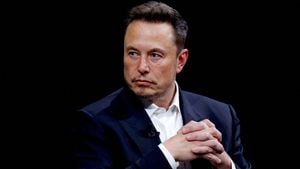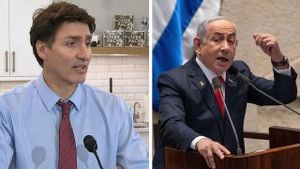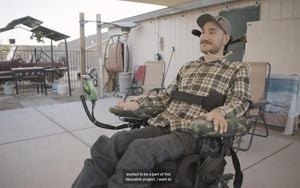Robert F. Kennedy Jr., long recognized for his anti-vaccine advocacy, has stirred significant controversy with his recent nomination to lead the Department of Health and Human Services (HHS) under the Trump administration. The decision has sparked fierce discussions among public health officials, politicians, and citizens alike, drawing attention to Kennedy’s complicated history and the potential consequences of placing him at the helm of such a pivotal health agency.
Currently, Kennedy serves as the chairman of the Children’s Health Defense, which promotes vaccine skepticism and has been at the center of the fight against what it perceives as authoritarian public health measures. His advocacy, often viewed as fringe or harmful by many health professionals, has garnered both fierce loyalty and hefty backlash, showcasing the deep divisions surrounding public health policy and vaccine safety.
Among those voicing concern is the former President of the American Medical Association, Dr. Todd A. O’Donnell, who warned, “Kennedy's views are contrary to the evidence-based principles we uphold.” He indicated the appointment could hamper the progress made over decades to curtail childhood diseases through vaccination, potentially leading to resurgence of illnesses like measles and polio.
Kennedy’s rise to the forefront of the HHS nomination also reflects larger societal debates about health misinformation, vaccine hesitancy, and the credibility of public health messaging. Over the years, his public appearances and social media engagement have been rife with claims disputing established scientific consensus; many accuse him of undermining public trust.
Critics, including notable health advocacy groups, argue Kennedy’s appointment could propagate misinformation within government policy, watering down public health initiatives and potentially endangering public safety. Some fear this movement could send ripples across the healthcare system. Ethan McLaughlin, spokesperson for the Coalition for Vaccine Awareness, stated, “This nomination risks eleveting anti-science rhetoric within institutions meant to protect public health.”
On the other hand, Kennedy has attracted support from certain segments of the population. His message resonates with individuals skeptical of pharmaceutical companies and government health policies. Supporters argue Kennedy's appointment may lead to more comprehensive discussions about health rights, vaccine safety, and government accountability.
Some believe Kennedy’s outsider status could challenge the status quo of public health policy. His perspectives, albeit controversial, could instigate necessary dialogues on transparency and ethics within the healthcare system. “He’s just bringing attention to issues others want to ignore,” argues Mariah Smith, who has followed Kennedy’s work for years. “People deserve to voice their concerns about vaccine safety.”
While protests against Kennedy’s nomination surged, echoing sentiments of disbelief among many healthcare professionals and politicians, groups supporting his nomination organized rallies, asserting their desire for varied perspectives within the health department. This juxtaposition of emotions showcases the broader divide on health beliefs and the enforcement of vaccination policies.
The nomination also raises questions about the government’s role in regulating health information and combating misinformation. Dr. Lisa Chen, director of the Public Health Alliance, explained, “We have to navigate this delicate balance between free speech and public health.” She posited the need for effective communication strategies to counteract the influx of misinformation without infringing on individual rights.
Through this tumultuous nomination process, it’s clear the conversation surrounding vaccines, health safety, and government guidance will continue to evolve. With the HHS’s role pivotal to shaping national health policy, all eyes will be on how Kennedy’s potential leadership may frame future health dialogues and initiatives.
Confronting the realities of the nomination, influential voices from the health sector fear the repercussions could entail significant setbacks not only for immunization rates but overall public health safety. They call for vigilance, urging citizens to remain informed and engaged as this story develops.
Discussions initiated by Kennedy's nomination highlight broader societal challenges. His controversial viewpoints inject urgency to the discussions on how health policies are formulated, implemented, and received by the public. Many health experts urge for proactive measures such as encouraging open dialogues facilitated by subject matters where differing opinions may converge on common ground.
Within the political arena, reactions to Kennedy’s nomination remain polarized. Democrats and some independent health officials voiced staunch resistance, advocating for his dismissal based on his contentious history with public health. Meanwhile, select Republican circles praised the selection, presenting it as fostering diversity of thought within government—sustainment of Kennedy’s polarizing image intact.
With the official confirmation hearings scheduled, it's anticipated these dynamics will play out with bold fervor, showcasing stark contrasts not just among party lines but among the varying opinions surrounding public health.
Potential confirmation hearings for Kennedy could become platforms where these divided views clash head-on. Senators from both sides are expected to interrogate his beliefs, seeking clarity on how his perspective on vaccines might inform his decision-making should he take the helm at HHS. These hearings could reveal much not just about Kennedy but about the current climate of public health discourse.
Once confirmed, the ripple effects on policy decisions could echo through schools, hospitals, and various aspects of public life. Observers believe this nomination could serve as both cautionary tale and call to action, emphasizing the dire necessity for fact-based public health strategies to trump misinformation.
Whether Kennedy's appointment will fortify or fragment the public health narrative remains to be seen. Each stakeholder from health professionals to concerned parents must contemplate their roles as the nation steps onto this precarious tightrope between health safety and questioning authority. The country finds itself at a crossroads where health, trust, science, and individual rights converge, creating vibrant discussions layering our public discourse.
Though the path forward may seem uncertain amid juxtaposed opinions, one thing remains evident—the individual and collective voices from both advocates and critics will significantly shape the outcomes of Kennedy's nomination. Undoubtedly, health discussions are now at the forefront of public imagination, braced for whatever developments lie down this uncharted path.
Consequently, as Kennedy’s confirmation hearings commence, the eyes of the nation will witness not just the fate of one man's appointment but the future ramifications for public trust, vaccine acceptance, and health policy's direction. What seems clear though is this is far more than just political maneuvering; it’s about the crux of public health guidance and individual autonomy, poised for debate at the highest levels of governance.
Kennedy’s nomination stands as more than just another headline—it’s symptomatic of underlying fissures within our collective perception of health, science, and the government’s role. How we evolve from this moment might define the future tone and tenor of health collaborations across all communities.



